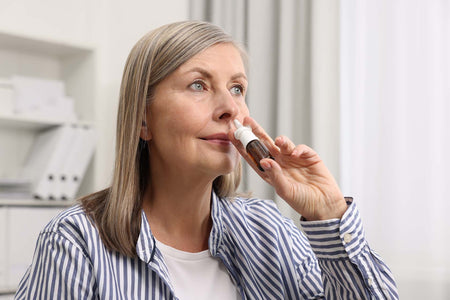- Some nasal sprays, antihistamines, and decongestants can provide quick relief, while leukotriene receptor antagonists and immunotherapy are for long-term management.
- Regular use as directed is needed for optimal results from any allergy medication.
- Factors such as the severity of symptoms, personal health conditions, and medication interactions can affect how quickly and effectively a treatment works.
Allergy symptoms like sneezing, itching, and congestion can be overwhelming. This is why many turn to allergy medications, hoping for quick relief. However, not all allergy medications work at the same speed.
Knowing how long each type takes to kick in can help you plan ahead and make sure you’re always prepared to feel your best when allergens strike. So, how long does it actually take for allergy medicine to work? We’ll explore the details in this article.
How Long Does It Take for Allergy Medicine to Work?
Fast-acting allergy medications like nasal sprays, antihistamines, and decongestants usually start to relieve symptoms in 15 to 60 minutes. On the other hand, slower-acting treatments, such as leukotriene receptor antagonists and immunotherapy can take days to weeks to show noticeable effects as they work by gradually adjusting the immune response or building tolerance.
Which Allergy Medications Provide the Fastest Relief?
For the quickest onset of action in relieving allergy symptoms, nasal sprays, antihistamines, and decongestants are often the most effective. These medications typically begin to work within minutes to an hour, providing rapid relief from sneezing, congestion, and itching.
Nasal Sprays
Nasal sprays like Allermi offer some of the fastest onset of action for allergy relief, often within 10-15 minutes. This is because they deliver medication directly to the nasal passages, where allergens cause inflammation and irritation. The localized application allows for rapid action on the affected tissues, which reduces inflammation and congestion more quickly.
Allermi takes a unique approach by using microdoses of oxymetazoline, a decongestant that constricts blood vessels in the nasal passages to reduce swelling and allow easier breathing.
Unlike traditional sprays like Afrin, which use higher doses and can lead to rebound congestion (rhinitis medicamentosa) if used too long, Allermi combines oxymetazoline with a nasal steroid. This combination helps reduce inflammation and provides long-term symptom control, which minimizes the risk of rebound effects.
For the best results, consistent use over several days to weeks is key, as symptoms will keep improving. Full relief may take 3-4 weeks, though initial benefits start sooner.
Oral Antihistamines
Oral antihistamines like Zyrtec, Claritin, Allegra, and Benadryl provide some of the fastest relief for allergy symptoms because they quickly block histamine, a chemical released by the immune system in response to allergens.
Histamine is responsible for symptoms like itching, sneezing, and runny nose. By interfering with histamine's action, antihistamines alleviate these symptoms rapidly, often within 1 hour, making them effective for quick relief from allergic reactions [*].
Related: Allegra vs. Zyrtec: Differences and Alternatives
Decongestants
Decongestants are effective for quickly alleviating nasal congestion by constricting blood vessels in the nasal passages, which reduces swelling and improves airflow. They generally provide noticeable relief within 30 minutes.
Nasal spray decongestants generally act the fastest due to their direct application. Common examples include oxymetazoline and phenylephrine. However, it’s important to use them as directed. Overuse can lead to rebound congestion — a condition where nasal passages become more congested once the medication is stopped. This creates a cycle of dependence on the spray.
Oral decongestants, on the other hand, are taken in pill form and work systemically. They typically take longer to start working, usually after 30 minutes to 1 hour. Examples include pseudoephedrine and phenylephrine [*].
Which Allergy Medications Take Several Days or Weeks to Work?
While fast-acting allergy medications offer quick relief, some treatments work more gradually and focus on long-term management. Here’s a brief overview of these slower-acting options and their timeline for relief:
Leukotriene Receptor Antagonists
Leukotriene receptor antagonists take several days or weeks to work. They gradually block chemicals that cause inflammation in allergic reactions. Unlike immediate relief medications, these take time to reduce inflammation and improve symptoms, so noticeable effects usually take a few days to appear.
These are commonly used to prevent and reduce symptoms of allergic rhinitis or allergic asthma. Examples are montelukast and zileuton.
Allergy Shots
Allergy shots take several months to work because they involve a gradual process of desensitization. The treatment introduces small, controlled amounts of allergens to the immune system over time, which aims to build tolerance and reduce the body's allergic response.
This slow buildup helps the immune system adapt for longer-lasting relief from symptoms. Still, it requires patience as significant improvement often takes several months to a year to become noticeable [*].
Sublingual Immunotherapy (SLIT)
Sublingual immunotherapy involves administering allergy treatment by placing medication under the tongue, as opposed to the traditional method of injecting it into the skin [*]. It takes a few months to work because it involves daily administration of small doses, which gradually helps the immune system build tolerance [*].
This slow process of desensitization aims to reduce the body's allergic reaction over time, so noticeable improvements in symptoms typically develop as the immune system adapts to the allergens.
What Other Factors Can Affect How Quickly Allergy Medicine Works?
Other factors that can affect how quickly allergy medicine works include the following:
- Severity of allergies. More severe allergy symptoms may require more time or a combination of treatments to manage effectively.
- Individual response. People metabolize medications differently so individual response times can vary. Factors such as age, weight, and overall health can impact how quickly allergy medication works.
- Underlying health conditions. Conditions like liver or kidney issues can affect how medications are processed in the body, which may influence their effectiveness and speed.
- Medication interactions. Other medications or supplements being taken can affect how well and how quickly an allergy medication works.
- Consistency and adherence. Regular and consistent use of medication as directed is needed to achieve the best results and can affect the speed of symptom relief.
Related: What to Do When Allergy Medicine Doesn’t Work
How Long Does It Take for Allergies to Go Away with Medicine?
Allergies typically can’t be eliminated quickly with medicine, but their symptoms can often be managed effectively in a relatively short time.
Fast-acting treatments like antihistamines and decongestants allow you to attain relief within hours, to control symptoms such as sneezing and congestion.
Long-term solutions, like immunotherapy, require months or even years to achieve significant reductions in allergic reactions, but adequate symptom relief is achievable with the right medications.
The Bottom Line
Knowing how long it takes for allergy medications to work can greatly impact your approach to managing allergy symptoms. While fast-acting options like nasal sprays, antihistamines, and decongestants offer quick relief, often within minutes to a few hours, some treatments necessitate a more gradual approach.
Remember that there's an option suited to every situation. Also, consistency in medication use is key to achieving the best results, and always consult with a healthcare provider who can tailor and adjust your treatment plan effectively.
References:
- Sur, D. K., & Scandale, S. (2010, June 15). Treatment of allergic rhinitis. AAFP. https://www.aafp.org/pubs/afp/issues/2010/0615/p1440.html
- Głowacka, K., & Wiela-Hojeńska, A. (2021). Pseudoephedrine—Benefits and risks. International Journal of Molecular Sciences, 22(10), 5146. https://doi.org/10.3390/ijms22105146
- Professional, C. C. M. (2024, May 22). Allergy shots. Cleveland Clinic. https://my.clevelandclinic.org/health/treatments/25194-allergy-shots
- Sublingual immunotherapy - allergy drops. (2023, September 5). Johns Hopkins Medicine. https://www.hopkinsmedicine.org/health/conditions-and-diseases/seasonal-allergies/could-allergy-drops-be-the-key-to-allergy-relief
- Professional, C. C. M. (2024a, May 1). Sublingual immunotherapy (SLIT). Cleveland Clinic. https://my.clevelandclinic.org/health/procedures/sublingual-immunotherapy-slit










